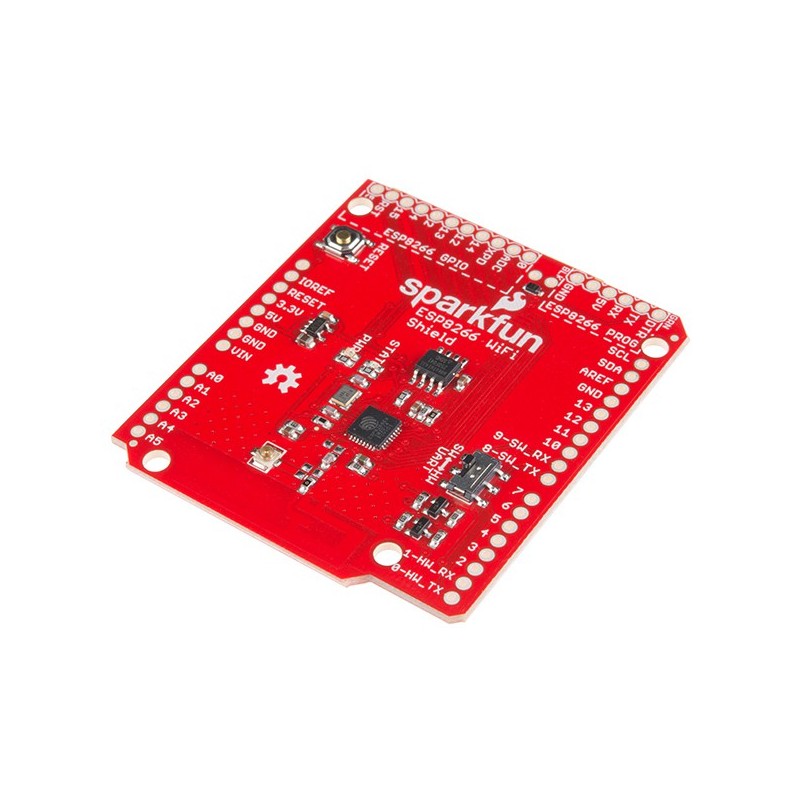

The SparkFun ESP8266 WiFi Shield is an Arduino compatible shield for the ESP8266 WiFi SoC – a leading platform for Internet of Things (IoT) or WiFi-related projects. There are a variety of designs based around the ESP8266, including tiny, modular boards and more accessible development boards like our very own SparkFun ESP8266 Thing. The ESP8266 WiFi Shield finds a middle ground between the Module and the Thing that provides a great introduction to the ESP8266 – without leaving the comfortable hardware confines of your Arduino. If you just have an Arduino project that needs an inexpensive gateway to the Internet, the ESP8266 WiFi Shield does everything from turning on an LED to posting data with phant.io.
The ESP8266 WiFi Shield comes pre-flashed with an AT-command firmware, so it can be controlled by any UART, but it also breaks out and provides command access to all of the ESP8266’s I/O. Since this is an Arduino shield, it makes it easy to attach to any development board that utilizes the Arduino R3 layout. All it will take is a little soldering to attach the necessary headers. The ESP8266 is much more than a simple serial-to-WiFi gateway. It has almost a dozen I/O that can be configured as digital inputs or outputs – it even has an ADC! These GPIO are all broken out towards the top-left side of the shield. Additionally, the ESP8266 WiFi Shield can be repurposed and reprogrammed through the programming port found on the top-right side of the shield. Whether you want to add AT commands of your own, or flash custom firmware on the ESP8266, this port may come in very handy especially with it utilizing the pinout of our FTDI Basic breakouts.
This shield comes populated with all components as shown in the images and schematic; but it does not come with headers installed. We recommend the Arduino R3 Stackable Header Kit.
Data sheet
Manufacturer BTC Korporacja sp. z o. o. Lwowska 5 05-120 Legionowo Poland sprzedaz@kamami.pl 22 767 36 20
Responsible person BTC Korporacja sp. z o. o. Lwowska 5 05-120 Legionowo Poland sprzedaz@kamami.pl 22 767 36 20
Arduino Uno Rev3 is a popular board with Atmel ATmega328 microcontroller from the AVR family, there are 14 I / O lines, 6 PWM channels and 6 analog inputs. The additional ATmega16U4 microcontroller realizes communication via the USB interface. Arduino A000066
WiFi 802.11 b/g/n module with ESP8266 system, they have 22 edge terminals with 2 mm raster with the possibility of soldered gold connectors, 9 GPIO lines and 1 ADC line on the connector. Built-in PCB antenna. ESP-12E
Development board with dimensions and spacing compatible with Arduino Uno R3. It have built-in Wi-Fi ESP8266 module. The device is compatible with WeDOS D1, it can be programmed from the level of Arduino IDE
Advanced expansion board for Arduino. It has support for mini-SIM cards and NB-IoT cards. Thanks to the GNSS module (Global Navigation Satellite System), it supports GPS, GLONASS, Galileo, QZSS and BeiDou GPS navigation systems. The module is powered by 7-12V voltage. DFRobot DFR0572
Shield with LTE CAT M1/NB-IoT SARA-R4 modem. Compatible with Arduino. Hologram SIM card included. SparkFun CEL-15087
No product available!
Shield designed for IoT applications with LTE CAT M1/NB-IoT SARA-R4 modem. The board is compatible with Arduino, allows you to add communication via cellular networks to Arduino boards. SparkFun CEL-14997
Expansion board based on the Wiznet W5200 Ethernet system. It allows you to easily connect Arduino to an Ethernet network. DFRobot DFR0125
NFC module designed for Arduino. Meets the standards of reader mode, P2P mode and card emulation mode. The board has an integrated RF antenna. NXP OM5578/PN7150ARDM
Expansion board with 4G/3G/2G communication module and GNSS positioning. The kit has pins compatible with Arduino and STM32 Nucleo. DFRobot TEL0124
Expansion board with GSM/GPRS module designed for Arduino and Raspberry Pi. It uses the Quectel M95 chip, the board has two audio connectors, a microSD slot and a dual SIM slot. A-GSM II Shield
No product available!
Ethernet network module with W5500 chip and PoE (Power over Ethernet) function. It communicates via the SPI interface, it has a built-in TCP/IP stack. DFRobot DFR0850
Ethernet network module with W5500 chip. It communicates via the SPI interface, it has a built-in TCP/IP stack. There are two Grove connectors with I2C and UART on the board. Seeed Studio 103030021
CAN module based on MCP2551 and MCP2515 systems with an OBD-II compatible connector. It uses the I2C or UART bus (Grove connectors) for communication. Seeed Studio 103030215
The Arduino expansion board is dedicated to applications that use NB-IoT communication. Thanks to the GNSS (Global Navigation Satellite System) module, it supports GPS, GLONASS, Galileo, QZSS and BeiDou navigation systems. The module is supplied with the voltage from 7 to 12 V. DFRobot DFR0572
Expansion board based on the Wiznet W5200 Ethernet chip. It allows you to easily connect the Arduino to the Ethernet network. DFRobot DFR0272
UART-RS485 converter module. It enables communication of Arduino boards with industrial modules. DFRobot DFR0259
Board with the GNSS Cinterion TX62 module with support for Cat. M1 and NB IoT. Dedicated for Arduino Portenta H7. Arduino ASX00027
No product available!
Module with Himax HM-01B0 camera and Ethernet communication dedicated to Arduino Portenta H7 boards. Arduino ASX00021
No product available!
Module with Himax HM-01B0 camera and LoRa communication dedicated to Arduino Portenta H7 boards. Arduino ASX00026
No product available!

Arduino compatible shield for the ESP8266 WiFi SoC – a leading platform for Internet of Things (IoT) or WiFi-related projects. WRL-13287
